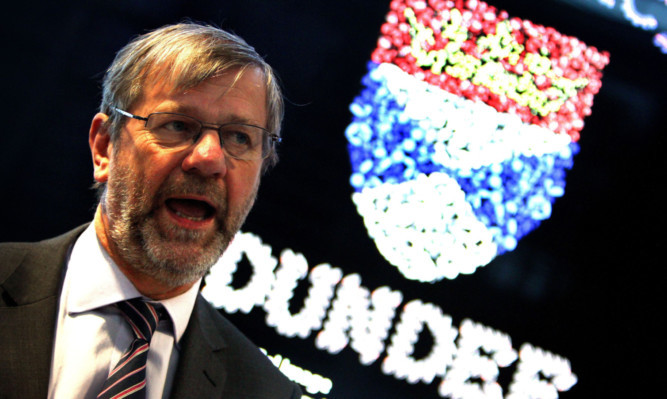Some of Scotland’s top universities are to lose millions of pounds of research funding in a move branded “short sighted” by one institution.
Dundee and St Andrews universities are among those hit by the latest announcement from the Scottish Funding Council (SFC), which distributes public funds to colleges and universities.
SFC said almost £700 million will be allocated for Scottish university research over the next three years to allow the country to continue to compete “at the highest level”.
But Universities Scotland said the announcement amounted to a cut of £12.9 million next year and warned of institutions becoming “victims of their own success”.
The body said universities would look for the cuts to be reconsidered in the next spending review.
Institutions that will have their research excellence grant cut include Dundee, St Andrews, Edinburgh, Robert Gordon and Glasgow School of Art.
Among those to benefit from an increase are Glasgow, Heriot-Watt, Stirling and the University of the Highlands and Islands.
The allocations follow changes to the way the main public grant for university research funding is calculated, aimed at making the process simpler and more transparent.
Universities Scotland said a higher proportion of the work submitted by Scotland’s universities was judged in a recent assessment to be at the highest levels of excellence, up from 52% in 2008 to 77% in 2014.
This has resulted in a smaller total pot of funding being shared by more institutions, the body said.
Professor Pete Downes, convener of Universities Scotland and principal at Dundee University, said: “It is incredibly disheartening to go from such a high in December and a feeling of great pride when our universities were confirmed as world-class and as delivering outstanding impact for Scotland through their research, to today’s funding allocations which confirm that many will lose out and there is no scope to build on that success.
“It’s very difficult not to feel like universities have become victims of their own success.”
Universities Scotland said the allocations also do not include the impact of the loss of the global excellence initiative, a two-year SFC initiative that was worth £14 million to universities in 2013/14 and 2014/15.
Taking both into account, Edinburgh University said it will lose almost £8 million in 2015-16 with further cuts rising to a total of £14 million a year.
A statement from the institution said: “This new move to fund world-leading research at a lower rate is very short sighted and will cause Scotland to start losing an important competitive advantage which currently delivers a wide range of jobs and opportunities for our communities and businesses.
“It will put universities like Edinburgh at a disadvantage compared with similar institutions in England with which we compete for research grants and the most innovative research staff.”
Principal Professor Sir Timothy O’Shea added: “The University of Edinburgh is now fourth in the UK for research excellence. The real world impact of that research on business, health and society is evident across the breadth of our activities.
“The decision to reduce funding for world-leading research in the University of Edinburgh by £8 million next year with further cuts rising to a total of £14 million/year will cause Scotland to lose an important competitive advantage that delivers jobs and opportunities for our communities and businesses.
“We are a small country which has achieved extraordinary innovation and international impact from research. Now is not the time to reduce investment in Scotland’s future jobs and prospects.”
Laurence Howells, SFC chief executive, said: “Today’s announcement of almost £700 million will mean Scotland carries on being a winner in the competitive world of university research.
“It will mean that Scotland can continue to attract and develop the best research talent and it will mean that organisations such as Cancer Research UK and the Wellcome Trust continue to invest in Scottish universities.”
The SFC said the allocations were in addition to a recent £120 million investment in eight innovation centres to improve links between education and industry.
Welcoming an increase in Glasgow’s research excellence grant, senior vice-principal Professor Neal Juster said: “Today’s announcement of the research excellence grant is good news for the University of Glasgow.
“It recognises the strength of research that is carried out here, and the growth in world leading and world-class activity noted in the recent UK-wide Research Excellence Framework exercise.”
A Scottish Government spokesman said: “We will again be providing over a billion pounds to Scottish higher education institutions in 2015-16, having invested more than £4 billion since 2011.
“We are demonstrating our ongoing commitment to research by providing £282 million through the Scottish Funding Council for 2015-16, building on increasing levels of funding since 2007.
“The new research funding model was designed by the SFC, supported by the sector, and provides a fairer, simpler and more transparent system of allocating funding that aims to further enhance the reputation of research in our world-leading universities.”
